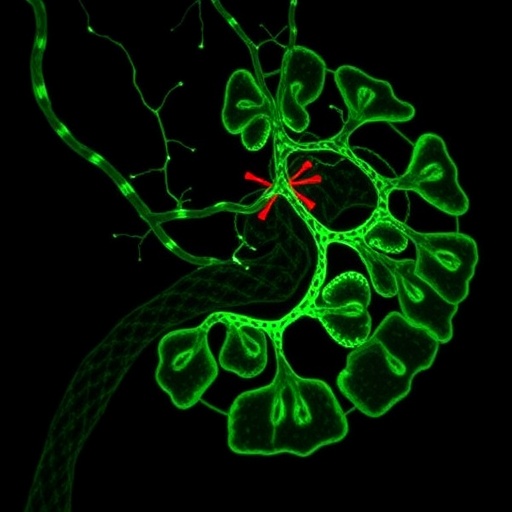In a groundbreaking study published in Nature Communications, researchers have unveiled a pivotal role of the integral membrane protein SMIM4 in modulating redox balance within pancreatic cancer cells. This discovery sheds light on the complex metabolic orchestration that underpins the aggressive nature of pancreatic tumors and opens promising avenues for therapeutic intervention aimed at disrupting cancer cell metabolism.
Pancreatic cancer, notoriously resilient and often diagnosed at advanced stages, exhibits a particularly robust metabolic reprogramming that allows malignant cells to thrive under oxidative stress. The redox balance, essentially the equilibrium between reactive oxygen species (ROS) generation and detoxification, is central to cancer cell survival and proliferation. SMIM4 emerges as a critical node within this metabolic circuitry, orchestrating malate compartmentalization that ultimately influences redox states in tumor cells.
The research team employed a suite of advanced molecular biology techniques including CRISPR-based gene editing, metabolomics, and live-cell imaging to unravel SMIM4’s exact function. Their data demonstrated that SMIM4 localizes predominantly to the membranes of subcellular compartments and facilitates the trafficking or retention of malate, a key intermediate in the tricarboxylic acid (TCA) cycle and linked metabolic pathways.
Malate’s compartmentalization appears to be essential for maintaining an intracellular environment conducive to optimized NADH/NAD+ ratios, which are critical cofactors in cellular redox reactions. By modulating malate availability within specific cellular locales, SMIM4 effectively tunes the downstream redox responses that cancer cells leverage for survival under oxidative duress.
Intriguingly, the disruption of SMIM4 function via genetic knockout or pharmacological inhibition led to a marked increase in oxidative stress markers and a simultaneous impairment in pancreatic cancer cell viability. This phenotype underscores the potential druggability of SMIM4 as a metabolic vulnerability in the otherwise notoriously refractory pancreatic adenocarcinoma.
Further biochemical analyses revealed that the malate pools regulated by SMIM4 engage with mitochondrial processes, particularly influencing the malate-aspartate shuttle—a critical system for transferring reducing equivalents across mitochondrial membranes. This inter-compartmental metabolic communication ensures efficient control over the oxidative phosphorylation machinery, which is often hijacked by cancer cells to meet their substantial energetic and biosynthetic demands.
The implications of these findings extend beyond a mere mechanistic insight. They provide a conceptual framework for designing next-generation therapies that target metabolic compartmentalization rather than solely focusing on enzymatic inhibitors of the TCA cycle or antioxidant systems. Such an approach could circumvent common resistance mechanisms seen in monotherapies aimed at redox regulation.
Equally compelling is the study’s integration of single-cell metabolic profiling, revealing heterogeneous SMIM4 expression patterns across pancreatic tumor sections. This heterogeneity could explain differential responses to conventional chemotherapies and points toward personalized metabolic interventions tailored to SMIM4 activity levels within patient-specific tumor microenvironments.
Importantly, the research also touches upon the crosstalk between SMIM4-mediated metabolic adaptations and oncogenic signaling pathways. Modulation of redox balance by SMIM4 appears to intersect with pathways related to hypoxia-inducible factors (HIFs) and nuclear factor erythroid 2-related factor 2 (NRF2), both crucial in enabling cancer cell adaptive response to oxidative and metabolic stress.
The synergies between altered malate metabolism and redox control highlight a systemic metabolic remodeling that empowers pancreatic cancer cells with increased resilience, metastatic potential, and resistance to apoptosis. Targeting SMIM4 might, therefore, sensitize tumors to oxidative damage induced by radiotherapy or chemotherapeutic agents, providing a combinatorial therapeutic strategy.
From a translational perspective, the identification of SMIM4 as a membrane-bound modulator offers practical advantages for drug targeting. Membrane proteins are frequently more accessible targets for small molecules or antibody-based therapies, facilitating the development of selective inhibitors that minimize off-target effects on normal tissues.
Moreover, this study prompts a reconsideration of malate’s role beyond its classical metabolic identity, positioning it as a dynamic signaling mediator whose spatial distribution within cells can decisively influence tumor biology. Understanding these compartmentalized fluxes represents a new frontier in cancer metabolism research.
Viewed through the lens of clinical oncology, these insights come at a crucial time when pancreatic cancer remains one of the deadliest malignancies, largely unaffected by the advances that have revolutionized treatments for other cancers. Metabolic targeting, inspired by the discovery of SMIM4’s function, could be pivotal in reversing this grim prognosis.
Looking ahead, ongoing investigations aim to dissect the regulatory networks that govern SMIM4 expression under different tumor microenvironmental conditions, including nutrient availability and oxidative stress. These efforts will be critical to predict therapeutic windows and optimize treatment regimens.
In conclusion, Wang and colleagues have charted a novel metabolic axis in pancreatic cancer, wherein SMIM4-mediated malate compartmentalization orchestrates redox homeostasis to sustain tumor growth and survival. This seminal work enriches our understanding of cancer metabolism and lays the groundwork for innovative interventions that could transform patient outcomes in this devastating disease.
Subject of Research: The role of the integral membrane protein SMIM4 in regulating redox balance through malate compartmentalization in pancreatic cancer cells.
Article Title: The integral membrane protein smim4 modulates redox balance via malate compartmentalization in pancreatic cancer.
Article References:
Wang, B., Han, X., Lin, X. et al. The integral membrane protein smim4 modulates redox balance via malate compartmentalization in pancreatic cancer. Nat Commun 16, 9772 (2025). https://doi.org/10.1038/s41467-025-64734-y
Image Credits: AI Generated




